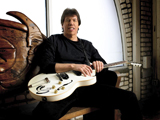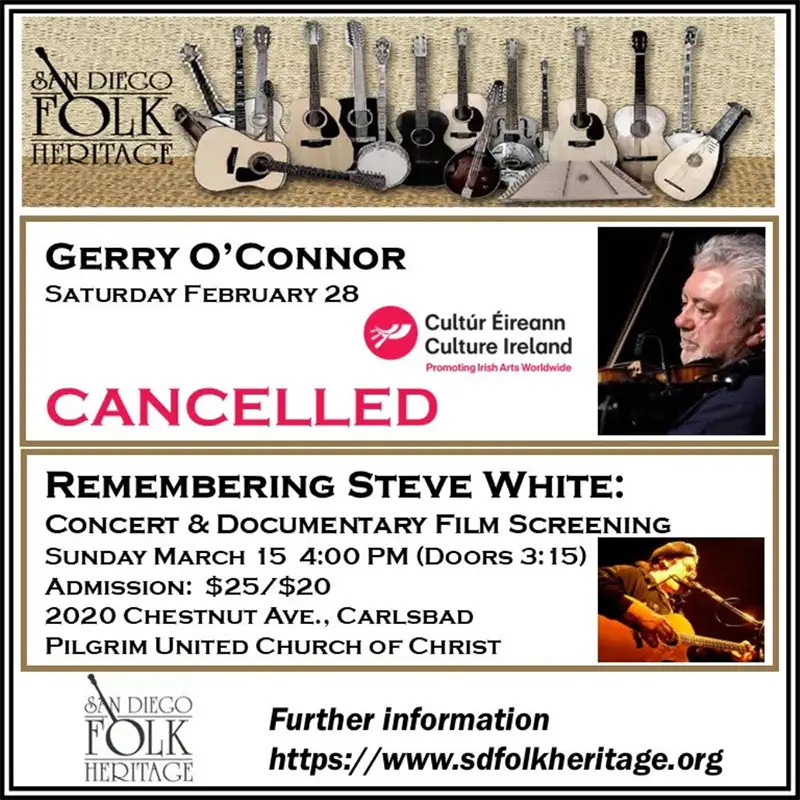Tales From The Road
From Baseball to Blues It’s All Thoroughly Thorogood

George Thorogood
“I say this to the world: The Beatles did what they did, the rest of us played the blues.”
– George Thorogood
There’s nothing more American than baseball and blues. For guitarist George Thorogood, they’re both roads he’s walked with passion. One as a rookie(second baseman) and one as a maestro showman, master of American blues rock — the kind founded in the late ’60s by artists like Eric Clapton and Jimmy Page but refined to perfection on the American shores of Delaware after he heard acoustic bluesman John Hammond. The year was 1970 and, ironically, it was a period of time when the free-form music that marked the late ’60s and paved the way for great blues rock trios like Cream to develop was being tamed into what would soon become a more corporate form of rock, replacing its blues fangs with business and money-driven corporate dentures. But, Thorogood didn’t know any better than to re-create the sounds he was hearing from the likes of Hammond, which led him to his roots before anyone knew to apply such a label to any form of music. He soon emerged a monster guitar player with the ability to spin blues licks faster than you could say home run. His repertoire grew and was unique for its time, comprised almost exclusively from the catalog of Chess records and the great R&B and blues recordings of the ’50s. He explored raw and powerful interpretations of Bo Diddley, Chuck Berry, Howlin’ Wolf, and John Lee Hooker while stylizing the blues feel of Elmore James. His playing was unique to lead guitar inventors of his day because rather than beginning from his blues roots and launching out from there, Thorogood went further into the basics of blues, refining it, sharpening, and energizing it with unparalleled tenacity and grit. In this he probably drew more from the Alvin Lee and Johnny Winter than from Clapton or Jeff Beck. By 1974, it was clear this electrified boogie blues that had become his personal trade mark would also become his professional passion. On the strength of the demo aptly titled Better Than the Rest he and his band, the Delaware Destroyers (later shortened to just the “Destroyers”) were signed to the pioneering independent Rounder Records, which like Thorogood started in music in 1970. Their debut self-titled CD was released in 1977. After slugging it out in the Delaware and then the Boston blues club circuit, their second album for Rounder, Move It On Over, resulted in a gold record with two familiar hits — the rock and roll cover of the Hank Williams classic “Move It On Over” and the Bo Diddley tune “Who Do You Love.” During these years playing the clubs Thorogood and the Destroyers became friends and tour companions with another blues rock band, the Nighthawks. As legend has it when the band was in Georgetown playing clubs across the street from each other they pre-arranged a performance of “Madison Blues” at midnight and Thorogood and Nighthhawks’ guitarist Jimmy Thackery met outside their respective gigs on M Street where they exchanged cables and traded each other’s bands at the opposite clubs.
But, in the ’70s baseball wasn’t through with George Thorogood. A devout fan, he has been known to schedule his tours around the ball season. A move that would make perfect sense to any baseball-inclined musician, which, I imagine, Steve Goodman would concur among others. Throughout the ’70s during his rise to blues guitar fame, Thorogood played semi-pro baseball for the Roberto Clemente League in Delaware where he was at one time named Rookie of the Year for playing second base. This is something he was able to do until musical success caught up with him. This would come in 1979 when his first two albums caught national attention. It was these two albums and Thorogood’s 1980 national 50/50 Tour, which took him to all 50 American states in 50 nights, that caught the attention of the Rolling Stones when they were scouting opening acts for their 1981 tour. For many in the audience, Thorogood and the Destroyers even out-rocked the Stones, sometimes nearly stealing the show, even leading Mick Jagger and Keith Richards to consider replacing Ron Wood with Thorogood when Woody was having problems with heroin addiction at the peak of the tour. The attention this garnered led to a 30-year career on the road and to several best-selling albums including the now classic Bad to the Bone and the platinum 1986 Live album. In 1982, when he left Rounder Records and signed with EMI/Capital and released the single “Bad to the Bone,” the song went on to become his best-known record, largely due to its use in films and commercials. It was forever etched on the movie audiences psyche over the last 25 years when it was used for the opening Arnold in shades, biker, and leather sequences in Terminator 2.
During the 1990s Thorogood’s record-selling fortune would change, leading to a switch in record labels and increased live performances where he’d always made his mark. His studio recordings are virtually interchangeable with his live work. While his studio sound is large and bold, like earlier blues generations, it’s the raw power of his live stage presences and the sound of his guitar filling a concert hall that continues to draw audiences and engage new generations of fans. During the ’90s, with the rise of grunge and alternative rock, blues rock fell out of fashion. But, over the last decade with the slow, steady growth of the Americana roots music movement, new appreciation has been generated for pure blues-based music, the kind George Thorogood pioneered and championed 30 years ago when he first stormed the national concert stage. Although it hasn’t been noticed enough, Thorogood first heard his music largely due to the lack of cooperate business and financial concerns in rock music during the late ’60s when most of the music was being discovered by independent record labels and free-form FM radio stations; when he first broke out in the late ’70s, it was through a wall of market-heavy bland rock music being sold by the big labels. His music and his blueprint for success was rooted in that late ’60s period of musical pioneering similar to the Sun Record days in Memphis, which gave independent Rounder Records one of their first and most successful artists and helped to eventually usher in what has today been labeled Roots and Americana music. If so, Thorogood was not only looking back when he began learning blues guitar, he was also looking ahead for us all to a time when we’d need the purity of blues played with raw passion.
But personally, Thorogood is self-effacing and unpretentious about his standing in music culture and its history. Even though albums released in this millennium, Ride ’Til I Die (2003), Hard Stuff (2006), an anthology of Greatest Hits: 30 Years of Rock (2004 on Capital, which went gold and was #1 on Billboard’s blues chart for 60 weeks and also won the magazine’s Blues Record of the Year), have met critical and commercial success; still, Thorogood says, “In 1970 I said ‘You ain’t no genius, George. You’ve got to figure out a way to do this with barely a high school education and no voice to speak of and some interesting chops on the guitar. But you’ve got to bullshit your way in there, man.’ I say this to the world: the Beatles did what they did; the rest of us played the blues. I once talked to Randy Newman and I was freaked out because he told me what a big fan of mine he was. I said, ‘Hey, you’re Randy Newman. You’re a genius.’ And after a while he got a little miffed. He said, ‘George, can’t I like ‘Bad to the Bone’? What’s the matter with you?’ He was singing the National Anthem at a ballgame and I couldn’t even concentrate on the game because I was so freaked out that Randy Newman not only knew who I was but that he dug what I do. When I was going home, my father-in-law said, ‘Look at it this way, I heard that Laurence Olivier was a big Three Stooges fan.’ You got it? That’s all Jeff and Billy and I were: Larry, Moe and Curley. But Larry, Moe and Curley are still on TV, OK? I’m still on the scoreboard.’’
Even so, his 2009 release on EMI/ Capital, The Dirty Dozen, retains the same raw power and blues-boogie joy that’s become his signature. It includes another classic country song turned R&B: Dave Dudley’s “Six Days on the Road.” On July 12, Thorogood and the Destroyers will release their fifteenth studio album, 2120 South Michigan Avenue. Like his earliest recordings it will include some originals along with classic interpretations of the songs of Willie Dixon, Muddy Waters, Chuck Berry, and Little Walter.
See George Thorogood in concert with special guest Kenny Wayne Shepherd at Humphrey’s by the Bay, 2241 Shelter Island Dr., Saturday, July 29, 7pm.








